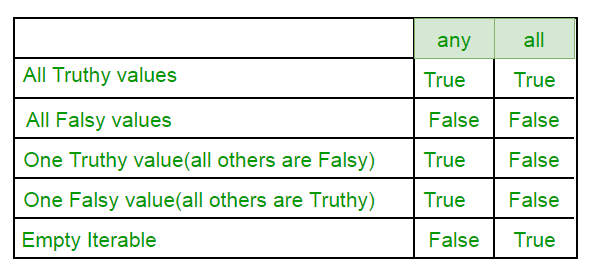2.1 KiB
| title |
|---|
| Python Any Iterable |
any() is a built-in function in Python 3 (and Python 2 since version 2.5), to check if any of the items of an iterable is True. It takes one argument, iterable. This table below is helpful in understanding all and any iterable.

Argument
iterable
The iterable argument is the collection whose entries are to be checked. It can typically be a list, str, dict, tuple etc., even a file object.
Return Value
The return value is a Boolean. It returns 'False' if and only if all entries of iterable are False, or the iterable is empty. This function essentially performs a Boolean OR operation over all elements.
If even one of them is True, it returns True.
The any() operation is equivalent to (internally, may not be implemented exactly like this)
def any(iterable):
for element in iterable:
if element:
return True
return False
It stops the execution as soon as the result is known.
Code Sample
print(any([])) #=> False
print(any({})) #=> False
print(any([None])) #=> False
print(any(['', {}, 0])) #=> False
print(any([6, 7])) #=> True
print(any([6, 7, None])) #=> True
print(any([0, 6, 7])) #=> True
print(any([9, 8, [1, 2]])) #=> True
print(any([None, []])) #=> False
print(any([9, False, [1, 2]])) #=> True
🚀 Run Code